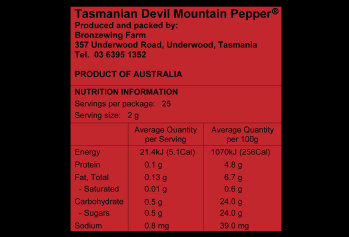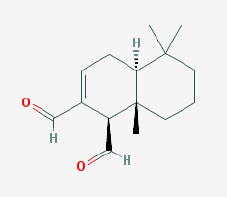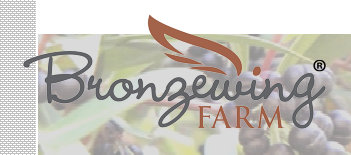Mountain Pepper is high in antioxidants (higher than blueberries, Konczak 2009), and a diet high in antioxidants may reduce
the risk of many diseases, including heart disease and certain cancers.
The Australian Broadcasting Corporation (ABC)
in Tasmania ran this story about the possible use of the high antioxidants in Tasmanian Mountain Pepper Berry in the cosmetics
industry. This video clip was posted on the ABC website on but has now expired.

The story derives from relatively recent research on the properties of Australian Native Foods. These research reports are:
Nutritional and Health aspects of Tasmanian Mountain Pepper
Antioxidants:
Anthocyanins:
Antimicrobial activity:
Mountain pepper berries aren't really black, more of a very, very dark red (think red wine grapes which look bluish when harvested).
This red-black colouration is due to high levels of anthocyanins (specifically cyanidins - 29.4 mg/g ; Konczak 2009). Anthocyanins
are strong antioxidants but they can also give a great reddish colour to your cooking. The anthocyanins can be brought out of even
our dried Mountain Peppercorns. Lemon juice, vinegar and brine are a great way to extract both colour and flavour out of the peppers.
Tasmanian Mountain Pepperberries had the highest antibacterial activity of any Australia bushfood - with high activity against both foodborne human pathogens and common food spoilage bacteria. Interestingly, the peppers had little activity against tested lactic acid bacteria which are beneficial microorganisms in foods such as cheese, yoghurt, sauerkraut, etc:
The biological activity of polygodial has been reported in the scientific literature to include antifungal and antimicrobial activities,
antihyperalgesia, potent attachment-inhibitory activity, insect antifeedant activity, antinociception, vasorelaxation action in vessels
of rabbit and guinea pig, anti-inflammatory and antiallergic activities (source: wikipedia).
What about the spicy 'heat' (the polygodial)?:


© Bronzewing Farm 2013-25



